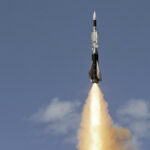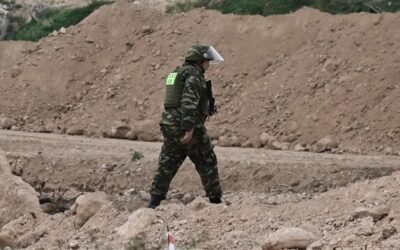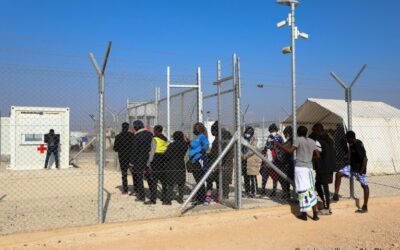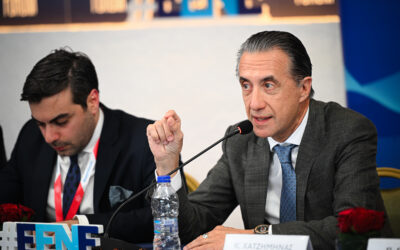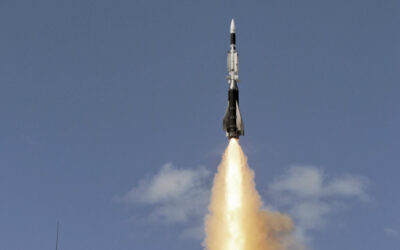Latvian authorities have called on citizens to turn their basements into air raid shelters, causing concern.

The Japanese government plans to dump treated radioactive water from the damaged Fukushima nuclear power plant into the ocean, sparking concerns and backlash.
The head of the International Atomic Energy Agency (IAEA) Rafael Grossi, currently visiting Japan, met with residents of Fukushima in an attempt to reassure them about the Japanese government’s plans to dump treated radioactive water from the damaged nuclear power plant into the ocean.
The IAEA on Tuesday approved plans to dump into the ocean about 1.33 million tons of contaminated water stored at the Fukushima nuclear power plant, which was severely damaged after the March 11, 2011 earthquake and tsunami.
After a two-year review, the IAEA announced that Japan’s plans comply with international safety standards and will have a negligible radioactive impact on people and the environment.
During his visit to Iwaki, about 60 kilometers from the nuclear plant, Grossi admitted there are concerns. All these graphs and complex statistics are one thing, but the reality, the reality of people, the reality of the economy, the reality of social mood and perceptions may be different, he admitted before residents and local officials.
Also read: Turkey | Explosion at missile factory in Ankara due to chemical reaction
Water from Fukushima has been filtered to remove most radioactive elements except tritium, an isotope of hydrogen that is difficult to separate from water. Before being discharged into the Pacific, the treated waters will dilute, so that the levels of tritium they contain are far below the internationally approved ones.
Japan’s neighboring countries, such as China, oppose the plans, as do some residents of Fukushima, mainly fishermen who worry that consumers will not buy their products.
Tetsu Nozaki, president of the Fukushima Federation of Fishermen’s Unions, said the Japanese government misunderstands the view of society, which is completely opposed to the plans.
This, as certified by the IAEA, is a more general practice that is accepted and has been tested in many areas around the world, Grossi added, saying he has no magic wand to assuage residents’ concerns, but stressing that the organization will establish a permanent office in the region to oversee the process.
The Chinese authorities are to ban food imports from roughly a fifth of Japan’s prefectures for safety reasons, Chinese customs said today, following Tokyo’s decision to dump radioactive water from the damaged Fukushima nuclear power plant into the ocean.
China, the world’s largest buyer of seafood exported from Japan, will now also scrutinize documents accompanying food exported from the archipelago, mainly all fishery, the customs press release added.
It is emphasized that surveillance measures and detection of radioactive substances will be strengthened, in order to guarantee the safety of food imported from Japan. The purpose is to prevent any importation of food contaminated with radioactivity, the same source explained.
For weeks Beijing has voiced strong opposition to Tokyo’s decision to dump radioactive water from the Fukushima plant into the sea.
Also read: April 26, 1986 | The Chernobyl experiment leads to the biggest nuclear accident – VIDEO
READ MORE
Elliniko | 314 bombs buried at former airport
Over 300 bombs from the Second World War have been found at the old airport of Athens in Elliniko. The news about the said…
Cyprus | Assessment of asylum applications suspended for Syrians
The Ministry of Interior of Cyprus announced the suspension of the assessment of asylum applications for Syrians, because of pending…
Hellenic Entrepreneurs Association | Ideas & Positions for the Promotion of Greek Entrepreneurship
The members of the Hellenic Entrepreneurs Association (E.E.N.E.) participated in a roundtable discussion entitled “Ideas, Positions…
Ukraine | Increase in defence spending by 367 million euros for the acquisition of drones
Kiev is increasing spending by 15.5 billion hryvnias (367 million euros) to bolster Ukraine’s armed forces with drones, according to…
HMoND | The legislative initiative for HCDI is under consultation
The legislative initiative of the Ministry of National Defence, under the title: “Establishment of the Hellenic Center for Defence…
Russia | Cluster bombs hit residential area in Odessa
Images from Russia’s strike in the heart of Odessa, which hit the so-called “Harry Potter Castle”, a former politician’s mansion now…
France | Industries prioritize orders of anti-aircraft missiles
The Armed Forces Ministry of France has instructed industries involved in the production of Aster anti-aircraft and anti-ballistic…
Ecuador | Appeals to International Court of Justice denouncing Mexico
Ecuadorian police stormed the Mexican embassy hours after the Mexican government granted former Vice President…












